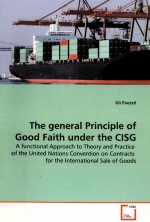
- 作 者:Foerstl
- 出 版 社:VDM Verlag Dr. Mueller e.K
- 出版年份:2011
- ISBN:9783639379006;3639379004
- 标注页数:117 页
- PDF页数:127 页
请阅读订购服务说明与试读!
订购服务说明
1、本站所有的书默认都是PDF格式,该格式图书只能阅读和打印,不能再次编辑。
2、除分上下册或者多册的情况下,一般PDF页数一定要大于标注页数才建议下单购买。【本资源127 ≥117页】
图书下载及付费说明
1、所有的电子图书为PDF格式,支持电脑、手机、平板等各类电子设备阅读;可以任意拷贝文件到不同的阅读设备里进行阅读。
2、电子图书在提交订单后一般半小时内处理完成,最晚48小时内处理完成。(非工作日购买会延迟)
3、所有的电子图书都是原书直接扫描方式制作而成。
INTRODUCTION 1
A.THE UN CONVENTION ON CONTRACTS FOR THE INTERNATIONAL SALE OF GOODS (CISG) 1
Ⅰ. Early Attempts to Unify Sales Lawl 2
Ⅱ. The 1964 Hague Conventions: ULIS and ULF 2
Ⅲ.UNCITRALand the CISG 2
Ⅳ.South Africa and the CISG 3
Ⅴ.Characteristics of the CISG 4
B.THE SCOPE AND METHODOLOGY OF THE DISSERTATION 5
Ⅰ.Good Faith and the CISG: the Problem 5
Ⅱ.The Structure of the Dissertation 6
CHAPTER 1: THE DEVELOPMENT OF GOOD FAITH 8
A.THE HISTORICAL ORIGINS 8
Ⅰ.Roman Law 8
Ⅱ. The Medieval ins commune and the lex mercatoria 10
B.THE COMMON LAW - CIVIL LAW DIVIDE 11
Ⅰ Treu und Glauben in German Law 14
1.Legislative Provisions 14
2.The Scope of Application of § 242 BGB 15
3.Determining Treu und Glauben 16
4.The’Inner-System’ of Fallgruppen 19
5.Functions of Treu und Glauben 21
(a) Interpretative Function 21
(b) Supplementary Function 22
(c) Corrective Function 23
Ⅱ.Good Faith in English Law 24
1.The Absence of a General Doctrine of Good Faith 24
2.Implied Terms 26
3.Promissory Estoppel 28
4.Economic Duress and Undue Influence 29
5.Statutory Provisions 30
C.THE UNIDROIT PRINCIPLES FOR INTERNATIONAL COMMERCIAL CON TRACTS 31
D.SOME GENERAL CONCLUSIONS ABOUT GOOD FAITH 33
Ⅰ. Good Faith: a Method not a Solution 33
Ⅱ.Good Faith and the Predictability of Justice 36
Ⅲ.Good Faith and the Sanctity of Contract 38
1.The Rule and the Exception from the Rule 38
2.Good Faith and the Need for Protection 39
E.THE FUNCTIONAL APPROACH To GOOD FAITH 40
CHAPTER 2: THE CISG AND THE GENERAL PRINCIPLE OF GOOD FAITH 42
A.MANIFESTATIONS OF GOOD FAITH IN THE CISG 42
Ⅰ. Article 7 CISG 43
Ⅱ. The Legislative History of Art.7 (1) CISG 44
Ⅲ.Objective-Normative Standards in Specific CISG Provisions 46
B.ARTICLE 7 CISG AND THE GENERAL PRINCIPLE OF GOOD FAITH 48
Ⅰ.Article 7(1) CISG as an Exclusively Interpretative Rule 49
Ⅱ.Article 7(1) CISG as an Obligation to Act in Good Faith 50
Ⅲ. Good Faith as a General Principle under Art.7(2) CISG 51
Ⅳ.Good Faith as a Matter to be Resolved by Domestic Law 52
Ⅴ. The Influence of UNIDROIT Principles and the lex mercatoria 53
Ⅵ. Analysis and Discussion 54
1.Interpreting Art.7(1) CISG 54
2.The General Principle under Art.7(2) CISG 56
(a) Deducing an Underlying Principle 56
(b) The CISG as a Closed System 57
3.The Scope and the Content of Good Faith in Art.7(1) CISG 58
(a) The Legal vs Moral Concept 58
(b) The Role of pacta sunt servanda 59
(c) Objective-Normative vs Subjective-Descriptive Understanding 59
(d) Functional Method vs Coherent Substantive Principle 60
C.OTHER MEANS TO FULFIL THE FUNCTIONS OF GOOD FAITH 64
Ⅰ. Interpretative Function 64
Ⅱ.Supplementary Function 65
1.The Limited Scope of the CISG 65
2.Interpretation of Contract Terms under Art.8 CISG 66
3.Trade Usage as Implied Contract Terms, Art.8(3), 9 CISG 67
4.General Duty to Co-operate under Art.7(2) CISG 68
Ⅲ.Corrective Function 69
1.Gap-filling praeter legem 69
(a) General Principles 69
(b) Solutions Outside the CISG 70
2.Contradictory Values within the CISG 71
D.FILLING THE GAPS WITH AN INDUCTIVE APPROACH TO GOOD FAITH 71
CHAPTER 3: GOOD FAITH IN THE CISG CASE LAW 73
A.IN tRODUCTION 74
B.THE INTERPRETATIVE FUNCTION 78
C.THE SUPPLEMENTARY FUNCTION 79
I.The Incorporation of Standard Terms in the Sales Contract 79
Ⅱ.Duty to Continue Long-Term Contractual Relations 82
D.THE CORRECTIVE FUNCTION 84
Ⅰ.The Restriction of Rights 85
1.Inconsistent Behaviour 85
2.Rights not Exercised timely (Waiver or Verwirkung) 88
3.The Forfeiture of Rights by the Conduct of a Party 91
Ⅱ. Derogatingfrom Express Rules 92
1.No Declarntion Required if its Purpose can no Longer be Ful filled 93
2.No Protection for the Fraudulent Party 96
3.The to quoque or ’Unclean Hands’ Defence 97
Ⅲ.Good Faith as a Basis for Damages? The ’Notorious Grenoble Case 100
E.CONCLUSION 102
SUMMARY 104
BIBLIOGRAPHY 106
TABLE OF CASES 113
